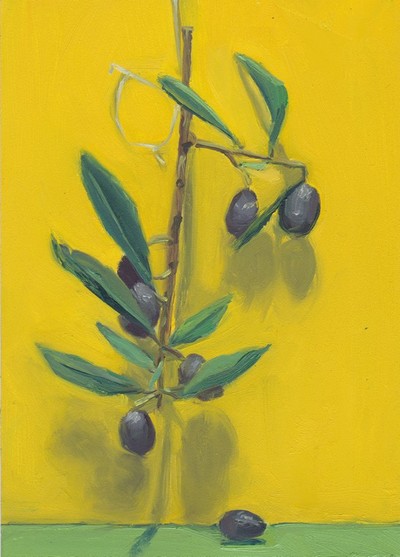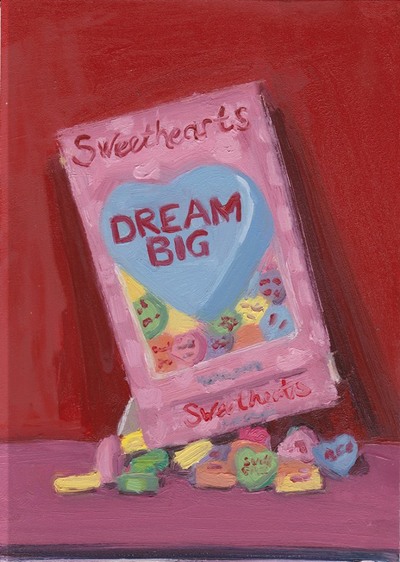Navigating the Election Part 2: Janette Maxey

Janette Maxey, “Olive Branch (for Peace),” 2016, oil on flashing. All images courtesy of the artist.
By Olivia J. Kiers
Hartford, CT-based painter Janette Maxey approaches her subjects, whether people, places or things, with empathy and an inquiring mind. Maxey’s experience living and working in Singapore taught her to use art as a way to connect to a new culture through the careful study of its common objects and sights. Back in the United States, she continues to study what makes cultures unique or approachable, with upcoming shows in Assisi, Italy (following a residency at Arte Studio Ginestrelle), and Concord Arts (February 7–March 5). Art New England spoke with Maxey in the weeks following the 2016 presidential election for the second installment of a series on New England artists, activists, and the election. Read the first here.
Art New England: Do you consider the art that you usually make to be political?
Janette Maxey: It’s not necessarily political, but then again, everything is kind of political, right? The things that I paint are about culture and my understanding of culture and how I relate to it.
ANE: Has this past election year changed anything about your normal art-making choices, and why or why not?
JM: Did the election affect the way I think about creating artwork? Yes. But I don’t feel like I’m making a commentary on the actual election or on politics. Rather, it’s a bigger picture understanding of our society and our culture and what it is about. I feel like I’m using objects in our culture—people, places and things—to understand and question our time and the things around us.
What I’m doing now is a continuation of what I was doing then [in Singapore] except it’s now within the United States, my own culture. The things that I paint—like cheese balls, for example—are a reflection of culture and our society. It’s not necessarily a judgment call on my part because I love cheese balls. Yet also, they are really engineered to be delicious for us, so that is a cultural thing. It’s part of our society—we’ve created this thing and we like it.

Janette Maxey. “Sweethearts (for wooing),” 2016, oil on flashing.
ANE: Among the artists in your circle, what has the general response to this year’s campaigning and election been? What do you think artists in Hartford, CT are thinking and feeling right now?
JM: Disappointment has been a big response, and then just shock, of course, like everyone. Even bigger than the election itself, the reaction to difference has been the biggest thing that I’ve been seeing. Some friends who are artists have said through casual conversation that they’ve had to “un-friend” people on Facebook because they have different political views.
ANE: As an artist post-election, which message resonates with you most: one of unity or of protest?
JM: It’s unity, for sure. Part of the work I’m doing is really about empathy. What I’m trying to convey is confronting something—unfamiliar or familiar—and using artwork as a tool for understanding stories we attach to that object.
Am I going to be continually active in making my society better? Yes, I am. Am I going to be loud about it? No, that’s not my style. That’s for other people to do. I’m quieter about things and I don’t want to be oppositional, I want to be inclusive. That’s just how I’m built as a human.
ANE: Are there any issues currently being discussed on a national level that particularly concern you as an artist?
JM: I don’t even know what word would encompass all of these things: the anti-Muslim, anti-immigration, anti-people-who-are-different stances. That makes me most upset and alarmed for my country. I know that there is discrimination everywhere, and it lives inside of everyone. It’s a human characteristic, but that part scares me the most.
I feel like the only thing I can do as an artist is try to be empathetic and to use objects that I love in our society as a link to one another. I’ve seen other artists react with really angry images… They have every right to be angry, and I understand where they are coming from. But I want… to try not to be preaching to the choir. I don’t want to be surrounded by people who think and live just like me. That would be boring. I like having people who are different around me, and that means everything: politically different, culturally different, religiously different, ethnically different… I want difference because that stretches my boundaries as a human.
I hope that in our culture, people start trying to understand one another, as opposed to being outraged.
